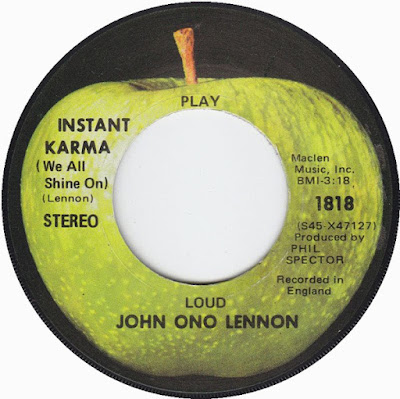Some days I find Paul & Linda McCartney's "Ram" a masterpiece, and if my mood is a bit down a disappointment or the first signs of aesthetic weakness in the world of Paul. I remember at the time that "Ram" was going to be the ultimate Paul album, after the low-key first solo album, which I think is still an incredible record. The up aspect of this album is "Too Many People," some say it's about Lennon, which at this time was the height of their series of poison letters to each other in the press, and in their music. Still, it's a beautiful production that is off-kilter and a great mixture of noise and pop. I like the entire side one, but there is a danger sign of "Uncle Albert/Admiral Halsey" that has elements of Paul's spiritual poison against himself. The word 'cute' comes to mind, and cuteness is not flattery in the hands of this musical genius.
"Smile Away" is an underrated Paul masterpiece, and I like the mixture of Linda's 'girl-group' back up vocals as well as it being a very driven 'rock' song. Side two is the so-so side, with "Heart of the Country" being a serviceable throw-a-way song. But then comes the eccentric "Monkberry Moon Delight" and then, work that is almost there on a high level, such as the last song "Back Seat of My Car," but is just product at the end of the day.
Paul wrote six of these songs by himself, and the others are co-credited with Linda. I'm not sure what she contributed to the songwriting or the making of the album besides her backup vocals. When Yoko Ono added material or vocals, you know it's 100% Ono, but Linda's contribution to the Paul McCartney post-Beatle years is a mystery to me. Not saying that Linda is not essential to the songs or recordings, but I'm curious how the relationship works in the making of music.
As a Beatle fan, I supported financially to the John and Paul solo years up to the mid-1970s, but then I woke up from my daze and realized that this is work that is not as good or interesting as their early solo work. The early singles and The Plastic Ono Band are masterpieces, and I feel that Paul's first album and "Another Day/"Oh Woman" are masterpieces as well. But when it came to "Imagine" and "Ram," it was a formula that dried up. What stayed consistent with the duo is their craftsmanship in writing proper songs. But the genius spark went missing. Their voices (singing) was fantastic, and everything was top-notch in backup musicians, and once in awhile they had a tremendous single or a song on an album; but very uninspiring in its scope and focus.
"Ram" is an album, on a good day, that I look back as a wonderful album. But once I dig into it, I find troubling aspects that became larger in his later work. Ironically enough, I love Wings "Wild Life," the album after "Ram," and also another back-to-basics work by him, as his first solo album. There is a conflict in McCartney's work that is between inspiration/experimentation and then pop poop. The dangerous thing is that he's very talented in making listenable pop poop, but needs to be pushed to make brilliant sonic art. Perhaps that's the beauty of The Beatles. That combination was magical, and once you leave the family you make music with, you are trying to replace that magic with real family members or listening or respecting too much the craft of putting together a song or record. Still, "Ram" has crucial moments of true greatness.




















